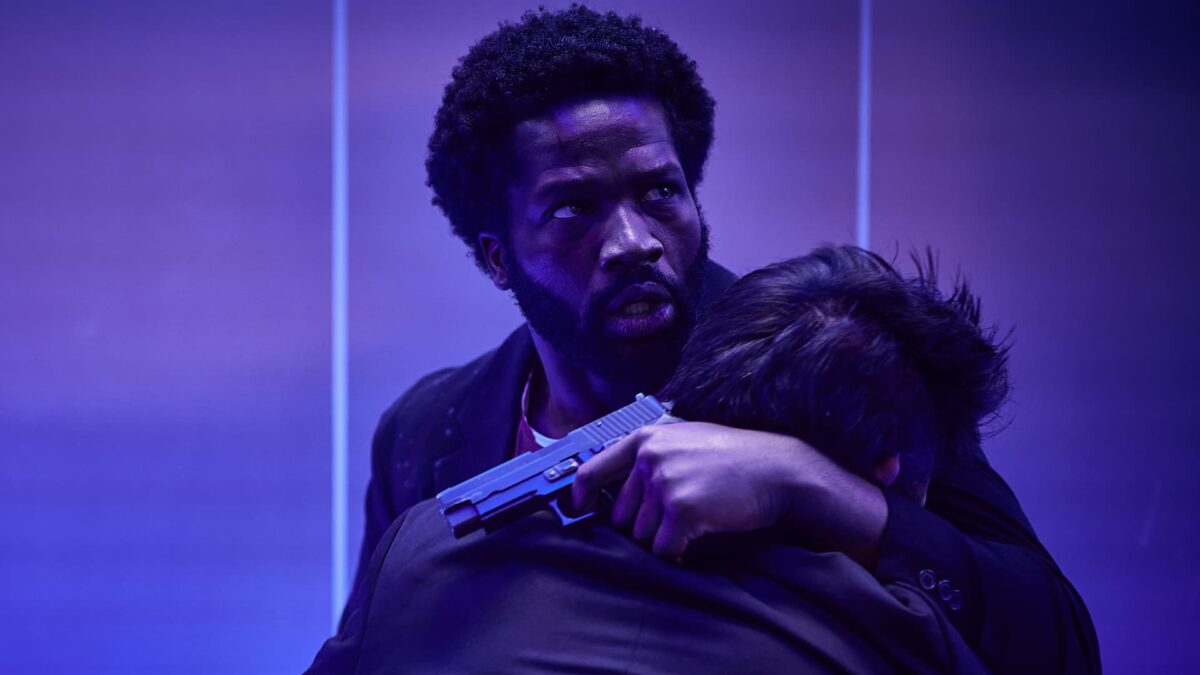Gangs of London
Season 2
Episode 7
Nightlife and knife fights
You know who feels curiously absent from Season 2 of Gangs of London? Finn Wallace.
I mean, he’s still dead, obviously, so he has a good excuse. But in Season 1, he was a looming presence from beyond the grave. The episodes were periodically stippled with flashbacks to Sean’s past, where we saw how his father towered over him, Colm Meaney’s fleshy bulk making the slender Joe Cole look effeminate and fragile by comparison.
Season 2 still intermittently uses flashbacks (and flash-forwards) as narrative devices, but Finn doesn’t show up in any of them. Colm Meaney is nowhere to be seen in the whole season; presumably not invited to reprise his role.
He gets namechecked here and there. In this very episode, Sean and Koba are trying to gain the favour of Bibi Agostini, a Parisian people trafficker who was once Finn’s business associate and potential mistress. (Tamar Baruch plays Agostini with a cruel, matriarchal sort of charisma. Between her and Marian, Finn obviously had a type.) The three of them have a laugh together about what a horndog Finn was.
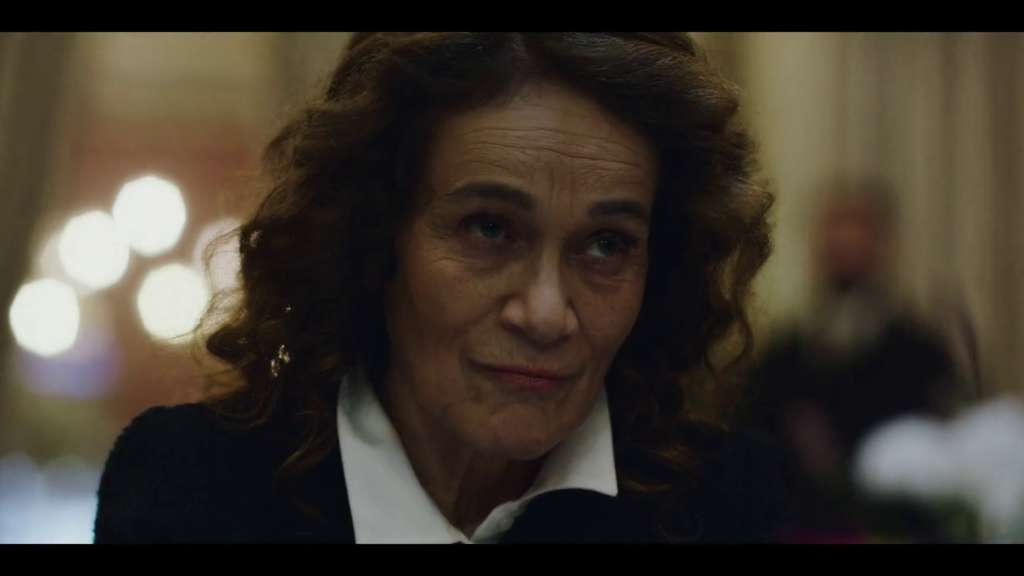
And yet – even though this whole show was set in motion by Finn’s assassination – his memory feels vague and distant. Despite the lip service in the dialogue, I don’t get the sense that Finn is a motivating factor for Sean anymore. Sean’s whole mission at this point is to consolidate his control over London.
And, like… why?
Didn’t he have his whole personal epiphany back in S1 E8, when he reckoned with the fact his father was a philandering arsehole who effectively disowned him? Didn’t he have his heart-to-heart with Alex in S1 E9, when he so fervently insisted: “We are not our fathers”?
I could buy that Sean wanted revenge against the Investors for his father’s death, but it seems he’s functionally achieved that already. S2 E6 treated the assassination of the Investors as if it were a footnote in the overarching plot; rendered offscreen, reported to the audience second-hand through news bulletins. What, then, is driving him to crown himself God-King of London? What matters to him that he’s working towards?
In S2 E3 he declares, passionately: “I’m a Wallace!” Sure. Fine. But what does Wallacehood entail, at this point? Is Sean really committed to carrying on the legacy of his cowardly loser of a Dad? What’s stopping him from just living the rest of his life on a Malibu beach? It seems like the writers need him to be a power-hungry megalomaniac, just to justify the plot points they have lined up.
Is Sean really committed to carrying on the legacy of his cowardly loser of a Dad? What’s stopping him from just living the rest of his life on a Malibu beach?
Season 2’s character writing is very superficial. I don’t understand what Sean wants; or, if I do, I don’t understand why he wants it.
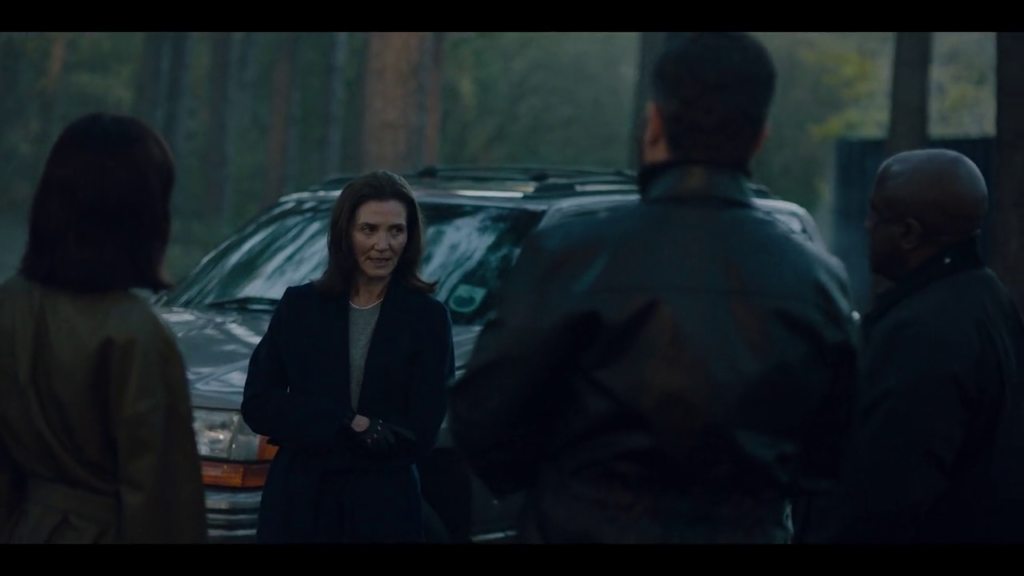
Nor Marian; I still don’t buy that she’d sell Sean out as easily as she does, let alone hold Billy prisoner at gunpoint when he gets wise to her treachery. This loose alliance between her, Shannon, Ed, and Luan against Sean, Koba, and Asif feels like an unconvincing state of affairs. We’re approaching the end of the season, and the lines for the climactic battle needed to be drawn somewhere, but this just seems arbitrary. What commonality do these particular characters share? What am I supposed to find compelling about their working together? I get the impression that none of these people have convictions or allegiances that run very deep; no person or philosophy that they won’t turn their back on the moment the wind starts blowing the other way.
And then there’s Elliot. I understand what Elliot wants, at least: he’s on a full-blown rampage at this point, brutalising and killing a lot of people in this episode for a shot at revenge against Sean. Again: I don’t like the fact that this is the trajectory his character arc took. Until now, Elliot stood in contrast to the power-hungry criminals around him. All the violence he committed was always in defense of something; either an ideal or an innocent.
Now, after the murder of his father, Elliot has turned into… well, John Wick, essentially. He’s a sharply dressed avatar of vengeance, out to punish and destroy the people who wronged him.
Now, after the murder of his father, Elliot has turned into… well, John Wick, essentially.
And that’s kinda boring. So he’s out for revenge: who isn’t out for revenge in this fucking show? It’s like the default state that everyone drifts towards by Brownian motion. It makes the cast feel homogenous. There’s no meaningful difference between one character and another; they’re all just rocks in a rock tumbler, rendered smooth and indistinguishable by friction and impact.
And yet – plot twist – I think S2 E7 is a damn good episode of TV.
“Superficial,” I called the writing: and that it is. But Gangs of London is good at superficial pleasures. Its story’s large-scale, long-term details may be gibberish, but when it comes to the short- and medium-term? This show can still shred when it wants to.
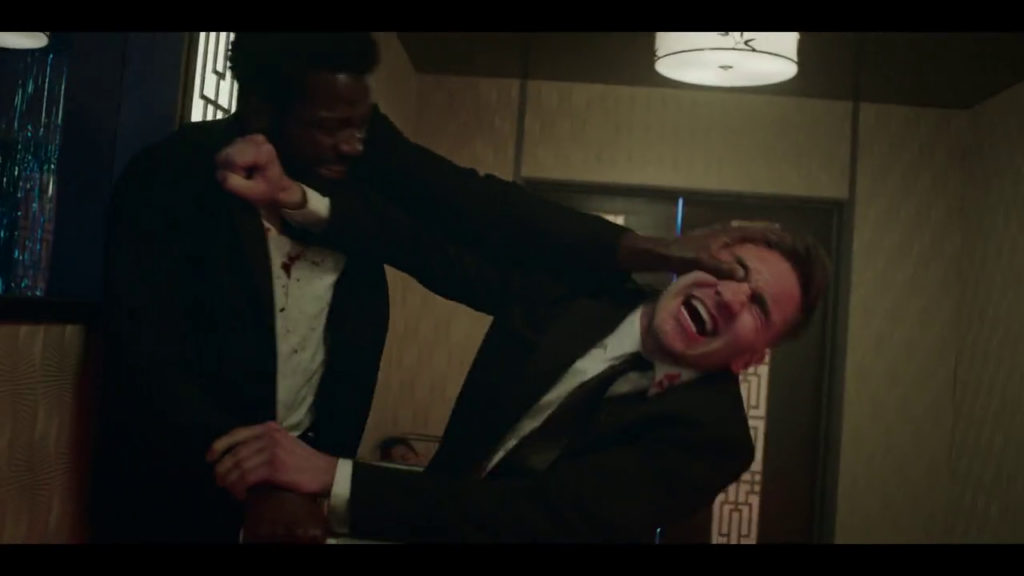
Corin Hardy returns as director, helming the last two episodes of the season. He orchestrates this penultimate episode around a single, protracted set-piece; Elliot’s infiltration of a Parisian nightclub. It’s the best set-piece of Season 2; maybe the second-best set-piece in the whole series, trailing only the epic gunfight in S1 E5.
The setup: Asif’s London-bound shipment of heroin has been hijacked (Luan and Marian are behind it). Without the cash-flow they were supposed to get from the heroin, their position is compromised. Sean hits upon a solution: one of his father’s old associates in Paris, Bibi Agostini, who might front him the drugs he needs to stay afloat, in return for a favourable business relationship. They take Saba with them, to act as a French/English translator.
Marian leaks this plan to her co-conspirators, and Elliot takes it as an opportunity to catch his enemies unaware while they’re on foreign soil. He meets up with a team of mercenaries in France to trail Sean and Koba, looking for an opening to strike. He finds just such an opening when he captures Saba. Reminding her of the night in the fishmarket when he saved her life, he offers her an opportunity to get her revenge on the Wallace scion, by facilitating his.
Saba takes him up on his offer; she plants a gun in a toilet cistern (a nod to The Godfather? Probably!) in the nightclub where Sean’s party meets with Agostini, and covertly feeds Elliot information on where to find them. These scenes feel like playing a stage of a Hitman game, in the best sense of that comparison. Jahz Armando portrays Saba as a lamb descending into the lions’ den; she’s part of Sean’s entourage, but Sean is well aware of the animosity she bears him for killing her father. One false move or badly-timed glance at her text history could leave her catastrophically exposed, and Elliot’s operation utterly compromised. Hardy ekes exquisite tension out of moments like her being frisked by club security, and the process of actually planting the gun.

Nevertheless, she plays her part well, and the plan gets as far as Elliot making his way into the club, armed and masquerading as a waiter headed to Agostini’s VIP booth. It’s here that the episode pulls its showiest flourish: it does the Silence of the Lambs thing, where the cross-cutting between the Agostini meeting and Elliot’s approach to the VIP booth deliberately misdirects the viewer. Elliot gets into a gruesome fight with the guards outside, and bursts through the door…
…And it’s the wrong booth. He’s just exploded as a tidal wave of blood and death into a karaoke party being thrown by a completely unrelated group of wealthy Koreans.
Saba, looking extremely uncomfortable as Sean and Agostini toast a new partnership, sneaks a look at her phone on another floor of the club. Her all-caps message – “WRONG ROOM ABORT” – has failed to send.
Elliot is left to fight his way out of the club, and his battle through an army of pissed-off Korean bodyguards is an epic. (One of his opponents is played by Jean-Paul Ly, star of the fun 2017 Cambodian Raid knock-off Jailbreak). Nightclubs are overrepresented onscreen as spaces for stylised, ultraviolent action, and I think there’s a reason for that. There’s something about a space that’s designed to facilitate sensory excess and Bacchanalian hedonism that automatically lends itself to scenes of cathartic, bloody expression.
There’s something about a space that’s designed to facilitate sensory excess and Bacchanalian hedonism that automatically lends itself to scenes of cathartic, bloody expression.
I compared Elliot to John Wick in this episode, and the comparison wasn’t idle. Gangs of London’s budget doesn’t extend to a set as grand as e.g. the Berlin club in John Wick: Chapter 4, of course, but the club in S2 E7 fulfills a similar function. Elliot’s journey is Orphean; descending through, then escaping from, a literal underworld. The trick with the cross-cutting just serves to underline the impression the club makes, with its reflective surfaces, and neon colours, and labyrinthine floorplan, and ear-splitting EDM. It’s a space that’s irrational; surreal; inebriating just by virtue of stepping inside.
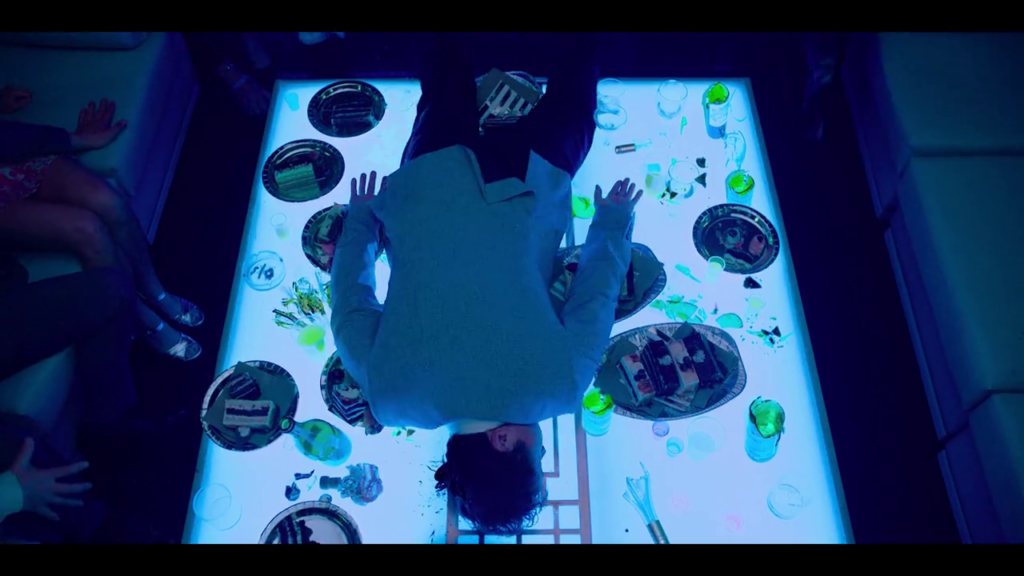
And Hardy makes terrific use of the space. DP Björn Charpentier employs the kind of roving handheld and energetic pans and tilts that I associate with Matt Flannery’s camerawork in action scenes, milking the fight for every drop of its intensity. What begins as a gun battle transitions to a brutal melee, Elliot using a mic stand as an improvised polearm for some gnarly finishing moves. Tim Connolly’s choreography sings.
S2 E7 is tautly paced and well-structured as a discrete episode of TV; plotted with the kind of flair and focus that I remember from S1 E3 and S1 E4. It starts from a clear inciting incident (the hijacked heroin shipment), and from there the tangled subplots dovetail and converge in ingenious ways. It points the way to a climactic reckoning from its first moments, and methodically brings its tension to a boil as it approaches that climax, such that the eventual explosion of spectacle feels earned as a pay-off.
It punts Elliot and Sean’s final confrontation to the season finale, but even though the final battle is deferred by the wrong-booth twist, it doesn’t feel like a cop-out or a narrative dodge. There are material consequences to this failed assassination attempt. Agostini cancels the deal when she sees Sean and Koba as vulnerable, leaving their position in London more tenuous than ever. Saba is discovered as a saboteur, and although Elliot escapes, CCTV footage confirms to Sean just who is trying to kill him… and leads him to suspect who among his confidants betrayed him.
It’s great fun; the most straightforwardly fun that Gangs of London has been in ages. It finds the show in the mode where it’s most comfortable with itself; playful genre pastiche, remixing tropes and images handed down from Johnnie To and Michael Mann and Kim Jee-Woon and Chad Stahelski.
It finds the show in the mode where it’s most comfortable with itself; playful genre pastiche…
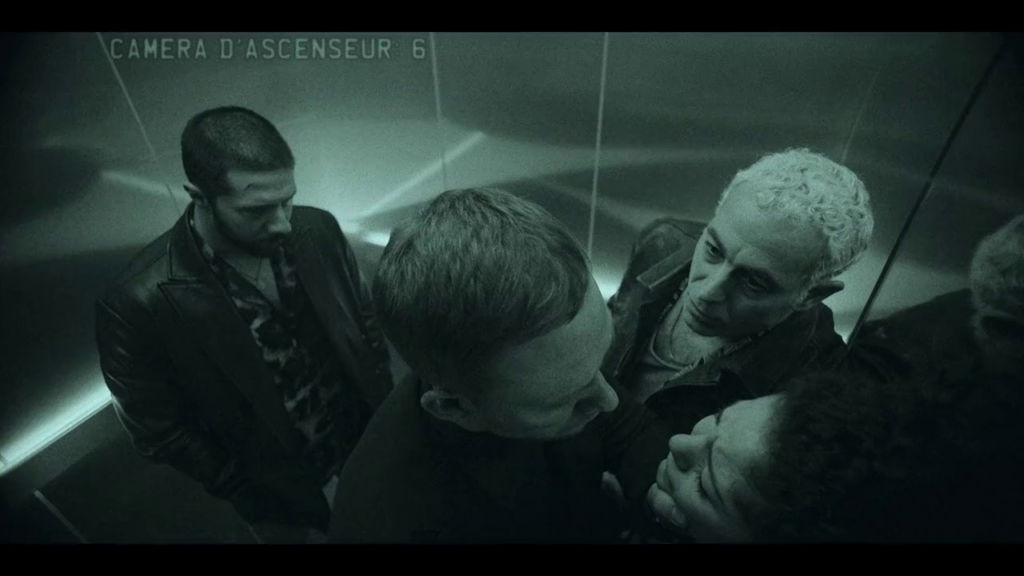
After the nightclub sequence, the episode still has one surprise up its sleeve, however, and it’s a nasty one. In the final scene, Sean is back in the Wallace townhouse, working himself up to confront Marian about her treachery. The conversation is cut short, though, when they take delivery of a package: a cardboard box, with one of its corners seeping something unsavoury. They look inside… to find Billy’s severed arm.
An earlier scene in this episode sees Elliot monologuing directly to the camera, talking about the experience of being “a pawn in someone else’s game.” The humiliations that he and his father endured all their life at the hands of the wealthy and powerful. “Pawns can’t be kings,” he was taught in childhood.
It’s an eerie, intense scene; framed in extreme close up against a pitch-dark background, Dìrísù’s face lit from below by a single, dim lantern. The episode returns to this framing device at the end; we discover that the person on the receiving end of Elliot’s monologue is a visibly scared Billy, strapped to a chair. He grows more terrified still when the dead-eyed Elliot advances towards him, wielding a hatchet.
If pawns can’t be kings, Elliot wonders aloud, can kings instead be turned into pawns? Can the elites of the world be made to understand the suffering, the degradation, the humiliation of the powerless? He’s worked so hard and sacrificed so much for the hope that the rich and the influential can be held to account by societal justice. Now, though, Elliot is finally prepared to adopt a rather more Nietzschean worldview; that the ability to inflict pain and suffering on others is sovereign.
The chess analogy is sophomoric, and not even terribly apt. (Can a pawn become a king, or a king a pawn? Well… no, not according to the mechanics of any chess game I’ve ever played. Bit of a dead-end of a metaphor.) Nevertheless, Gangs of London is keen on its chess imagery. In the key art for Season 2, used to advertise the show on billboards and streaming service landing pages, the London skyline is rendered to have its towers look like game pieces. The show would like its viewership to conceptualise it like a chess game; for its constant shifting of power dynamics; for its gambits and counter-gambits; for the ways that players can be suddenly and ruthlessly removed from the board.
The show would like its viewership to conceptualise it like a chess game; for its constant shifting of power dynamics; for its gambits and counter-gambits; for the ways that players can be suddenly and ruthlessly removed from the board.

Now, I like chess as much as the next nerd. (I’m not good at it, but I like it.) I enjoy the dilemmas it generates, in the choice between one move or another. I enjoy how seemingly innocuous decisions early on can have drastic ramifications further down the line. I enjoy how carefully laid traps and careless mistakes can lead to immediate reversals of fortune. I enjoy the ways that players can spend dozens of turns manouevring and counter-manouevring, building a latticework of tension and pressure between pieces, only for it to finally snap, ending in a bloodbath that clears a third of the board.
All of these are pleasures that I get from S2 E7.
The trouble is… well, I don’t empathise with chess pieces. It’s a game that’s deliberately abstracted and decontextualised. The pieces don’t meaningfully represent or refer to anything except the actions they can perform in their ludic environment. I might be annoyed if my knight is taken, but it’s not because I was ever fond of that knight; I’m just annoyed that I’ve lost its utility.
That feels, to me, like the wrong attitude for a showrunner to have about the characters with whom they populate their fiction. It goes a long way towards explaining why Season 2 feels so casually inhuman. If the dramatis personae are all just pieces on a cosmic chessboard, it helps me understand why their motivations and allegiances feel so slapdash and arbitrary, even while their conflicts can be as precise and as thrilling as they are here.
- Review Series: Gareth Evans
Is It Good?
Very Good (6/8)
More Gangs of London reviews
Andrew is a 2012 graduate of the University of Dundee, with an MA in English and Politics. He spent a lot of time at Uni watching decadently nerdy movies with his pals, and decided that would be his identity moving forward. He awards an extra point on The Goods ranking scale to any film featuring robots or martial arts. He also dabbles in writing fiction, which is assuredly lousy with robots and martial arts.

